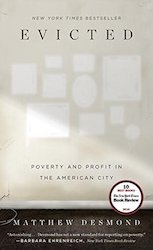
Most people have a vague sense of the poverty issue in big American cities. But very few of us know it in detail, and even fewer of us know it on the kind of intimate level that Matthew Desmond opens up for us in Evicted. The book won the Pulitzer Prize for General Nonfiction in 2017 and it’s easy to see why. It’s a masterful evocation of the problem of poverty in American cities, especially in regards to housing, but it’s also a compelling argument for two proven ways we could solve the bulk of the problem.
Desmond takes on on a survey of a number of families, some black some white, in Milwaukee over a two-year stretch in the late 2000s. For 300 pages, we see how the cycle of poverty and evictions is a catastrophic classic Catch-22. And the system’s rigged in favor of landlords, so there are endless economic incentives for them to keep the cycle going.
If you’re poor and have limited job prospects, especially if you’re a single parent, your options in the city for housing are extremely limited. What’s worse is that even in the poorest neighborhoods, the rents are as high as in much nicer neighborhoods, where the poor aren’t even allowed to rent. If you’re living on assistance, rent alone can eat up as much as 70% or 80% of your monthly check, leaving virtually nothing for food, clothing, medical costs, or transportation. So eventually something will happen that puts you behind on your rent and you get evicted. Evictions go on your public record, however, making it even more difficult to find a new place to live. This pushes you into worse and worse housing, or homeless shelters if they have room. It’s a downward spiral that’s virtually impossible to escape.
After the 300 pages of personal examples, Desmond gets to his essential argument in the Epilogue. I’ll let you read this for yourself, but I’m convinced that he’s correct that we can fix this problem if we follow some paths that have proven successful elsewhere. But it requires us to commit to the fundamental belief that safe and affordable housing should be a fundamental right in America. Read this book. It will open your eyes and does provide a way out of the misery. We should listen to Desmond’s argument and change our priorities.
Desmond takes on on a survey of a number of families, some black some white, in Milwaukee over a two-year stretch in the late 2000s. For 300 pages, we see how the cycle of poverty and evictions is a catastrophic classic Catch-22. And the system’s rigged in favor of landlords, so there are endless economic incentives for them to keep the cycle going.
If you’re poor and have limited job prospects, especially if you’re a single parent, your options in the city for housing are extremely limited. What’s worse is that even in the poorest neighborhoods, the rents are as high as in much nicer neighborhoods, where the poor aren’t even allowed to rent. If you’re living on assistance, rent alone can eat up as much as 70% or 80% of your monthly check, leaving virtually nothing for food, clothing, medical costs, or transportation. So eventually something will happen that puts you behind on your rent and you get evicted. Evictions go on your public record, however, making it even more difficult to find a new place to live. This pushes you into worse and worse housing, or homeless shelters if they have room. It’s a downward spiral that’s virtually impossible to escape.
After the 300 pages of personal examples, Desmond gets to his essential argument in the Epilogue. I’ll let you read this for yourself, but I’m convinced that he’s correct that we can fix this problem if we follow some paths that have proven successful elsewhere. But it requires us to commit to the fundamental belief that safe and affordable housing should be a fundamental right in America. Read this book. It will open your eyes and does provide a way out of the misery. We should listen to Desmond’s argument and change our priorities.
 RSS Feed
RSS Feed
